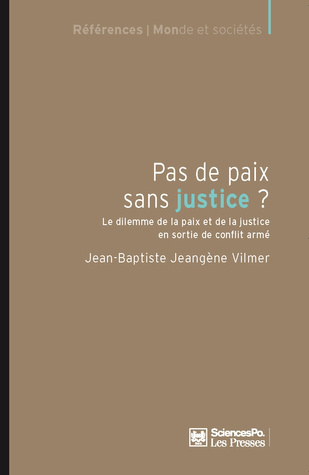Pas de paix sans justice ?
Le dilemme de la paix et de la justice en sortie de conflit armé
First Edition
Examining the history of international criminal justice, from Nuremberg to today, with the aid of numerous examples from the Balkans to Libya, touching on Rwanda and Darfur, this book questions the pacifying effect of justice and its limitations. Read More
After armed conflict, must those who committed war crimes, and crimes against humanity, such as genocide, be prosecuted, or integrated into the transition process in the name of peace? Prosecuting them risks a destabilization of society, but doing nothing could lead to the same result, a peace bought by a risky provisional impunity.
The author examines this dilemma in light of the history of international penal law, from Nuremberg to today, and with the aid of numerous examples, from the Balkans to Libya, touching on Rwanda and Darfour. He examines the role of international tribunals: are they a condition of peace (no peace without justice) or instead an obstacle to peace (no justice without peace)? Do they have dissuasive effects? Can one surpass this dilemma?
He also poses the question of the relationship engaging two major actors on the political stage: the Security Council, a political body charged with the maintenance of peace and security, and the international penal court, a judiciary body responsible for prosecuting the authors of the most serious crimes. Is the international penal court really independent from the Security Council, and more importantly, must it be? An essential reflection, at the beginning of this century, facing the return of war.
Jean-Baptiste Jeangène Vilmer, philosopher and Juris Doctor, is a researcher of international law on the law faculty at McGill University (Canada). Author of a dozen works, among them Réparer l'irréparable. Les réparations aux victimes devant la Cour pénale internationale (PUF, 2009) et Turkménistan (CNRS Éditions, 2010), he has taught at the War Studies department at King's College of London.
Specifications
- Publisher
- Presses de Sciences Po
- Author
- Jean-Baptiste Jeangène Vilmer,
- Collection
- Références
- Language
- French
- Publisher Category
- > Geopolitics > International Relations
- Publisher Category
- > Fields > World and societies
- Publisher Category
- > Geopolitics
- Publisher Category
- > International
- Publisher Category
- > International field
- Publisher Category
- > Law
- Publisher Category
- > Society
- BISAC Subject Heading
- POL000000 POLITICAL SCIENCE
- Onix Audience Codes
- 06 Professional and scholarly
- CLIL (Version 2013-2019)
- 3283 SCIENCES POLITIQUES
- Title First Published
- 14 November 2011
- Subject Scheme Identifier Code
- Thema subject category: Politics and government
Paperback
- Publication Date
- 14 November 2011
- ISBN-13
- 978-2-7246-1233-2
- Extent
- Main content page count : 300
- Code
- 978-2-7246-1233-2
- Weight
- 300 grams
- List Price
- 18.50 €
- ONIX XML
- Version 2.1, Version 3
ePub
- Publication Date
- 14 November 2011
- ISBN-13
- 9782724687736
- Product Content
- Text (eye-readable)
- Extent
- Main content page count : 300
- Code
- 9782724687736
- Technical Protection ebook
- Adobe DRM
- List Price
- 9.99 €
- ONIX XML
- Version 2.1, Version 3
Google Book Preview
Contents
PREMIÈRE PARTIE Le dilemme de la paix et de la justice
Chapitre 1 / LE DILEMME DANS L'HISTOIRE DE LA JUSTICE PÉNALE INTERNATIONALE
Nuremberg et Tokyo
Les tribunaux ad hoc1
Les juridictions pénales internationalisées ou hybrides
Chapitre 2 / L'EFFET PACIFICATEUR DE LA JUSTICE ET SES LIMITES
Mettre hors-jeu et dissuader
Des limites structurelles
La justice internationale est-elle dissuasive ?
Le problème de la crédibilité
La justice pénale est trop rétributive
La paix au prix de la justice
DEUXIÈME PARTIE Les relations entre la Cour pénale internationale et le Conseil de sécurité
Chapitre 3 / CONCILIER LA PAIX ET LA JUSTICE
L'exagération de la menace contre la paix
L'exagération de la menace contre la justice
Au-delà de l’opposition entre réalisme et idéalisme
Le dépassement du dilemme
Chapitre 4 / QUAND LA PAIX A BESOIN DE LA JUSTICE : LA SAISINE DE LA COUR
Caractéristiques de la saisine
Inconvénients de la saisine
Avantages de la saisine
Les premières saisines
Chapitre 5 / QUAND LA PAIX NE VEUT PLUS DE LA JUSTICE : LA SUSPENSION DES TRAVAUX DE LA COUR
Justification et genèse de l’article 16
Les limites de la suspension
Les problèmes liés à la suspension
Chapitre 6 / RÉSOLUTIONS DU CONSEIL DE SÉCURITÉ À LA LÉGALITÉ DISCUTABLE : DE L’IMMUNITÉ À L’IMPUNITÉ
Le détournement de l’article 16 dans les résolutions 1422 et 1487
L’immunité accordée à certains individus
Le risque de la perception d’une justice à sens unique
Chapitre 7 / QUAND LA COUR EMPIÈTE SUR LA CHASSE GARDÉE DU CONSEIL DE SÉCURITÉ : LE CRIME D’AGRESSION
La compétence de la Cour
La subordination de la Cour au Conseil de sécurité
La complémentarité : responsabilité étatique et responsabilité individuelle
L’amendement de 2010
Conclusion

